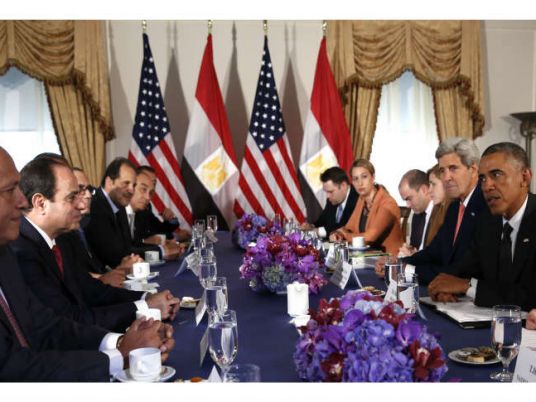
Cairo and Washington both see the upcoming dialogue as a means of signaling that political disagreements will not torpedo the core relationship anytime soon, Eric Trager and Eitan Sayag said in a report published in the Washington Institute.
The high-level exchange reflects both countries' desire to emphasize shared regional interests over the political disagreements of the past two years. In this sense, the dialogue is primarily about optics, since the more substantive aspects of the relationship are already being managed through other, less public channels, the report added.
While the U.S.-Egypt Strategic Dialogue has been described as a "regular" bilateral exchange, this week's meetings in Cairo mark the first such talks in nearly six years. Prior to 2009, however, Washington and Cairo convened the dialogue periodically to emphasize shared regional goals even when they differed politically. One of the primary purposes of these discussions was to signal ongoing commitment to the Arab-Israeli peace process.
The first dialogue was held in July 1998 at the ministerial level. Coming at the height of the Oslo peace process, it sought "to ensure…close coordination on political and diplomatic matters and to draw public attention to this aspect of our strong bilateral relationship." The Clinton administration convened additional rounds of the dialogue at the assistant ministerial level in December 1998 and February 1999.
The George W. Bush administration similarly viewed the U.S.-Egypt relationship as vital for advancing the Israeli-Palestinian peace process, and in March 2002 it announced that it would initiate another round of dialogue meetings for "regular coordination on political, economic, and military issues."
It repeated this call in July 2004 and February 2006, but did not ultimately convene another dialogue exchange until July 2006, at which point the Lebanon war and its regional fallout was added to the agenda. The dialogue also reflected the administration's desire to move beyond its disagreements with Cairo regarding the "Freedom Agenda."
During its first year in office, the Obama administration continued these efforts to "revitalize" the relationship. Following the president's June 2009 Cairo address, Washington reconvened the Strategic Dialogue at the assistant ministerial level, and a second round was held in December of that year.
Drawing from leaked U.S. documents, the London Telegraph reported that the discussion focused on joint efforts to advance the Israeli-Palestinian and Israeli-Syrian peace processes, while also covering issues such as the Sudan humanitarian situation and Iraq's territorial integrity. At the time, the administration viewed the dialogue as an inappropriate setting for addressing concerns about Egypt's autocratic politics, and thus considered separate, nongovernmental channels for discussing political reform, the report noted.
